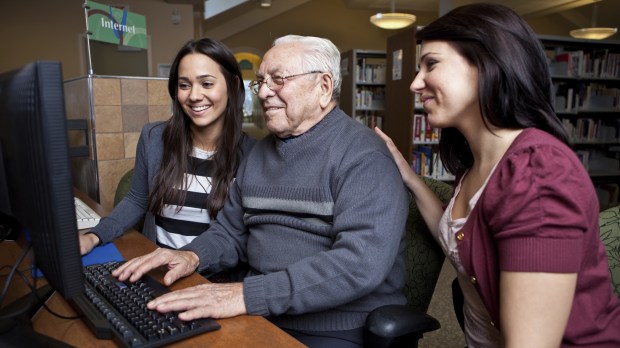Lenten Campaign 2025
This content is free of charge, as are all our articles.
Support us with a donation that is tax-deductible and enable us to continue to reach millions of readers.
Society has changed at lightning speed the past few decades, especially when it comes to the technology that we use every day. Many people love these changes and wholeheartedly embrace them—smartphones, same-day shipping, streaming services and all.
But for many elderly people, these changes have not been an unalloyed good. In fact, they’ve created a massive problem: Without sufficient understanding of how to use technology, many elderly people feel shut out of society and may be unable to complete necessary tasks.
I didn’t fully realize the extent of this problem until I was working at my local library a few Saturdays ago. Sitting near the circulation desk, I overheard an elderly woman approach the librarians with an issue that struck me as outside their jurisdiction.
She had inadvertently purchased some very expensive item on Amazon without meaning to do so, and now she could not figure out how to return it. To make matters worse, she couldn’t figure out her Amazon password to sign into her account.
As I listened, two librarians spent over an hour trying to help her resolve the issue. Their patience as she became increasingly loud and agitated was truly impressive.
I kept wondering, “Why is she treating the librarians like her own personal tech support service? Is this really in their job description?”
Finally, they reached a resolution and she left the library. I know my local librarians well, so as I prepared to head home myself, I couldn’t help commenting on what I’d just seen.
“Wow, she was acting like you were her tech support,” I said. “Does that kind of thing happen often?”
The librarians’ response really surprised me, and opened my eyes to just how widespread the issue is.
“Oh yes, it happens all the time,” one librarian said.
The other chimed in, “It’s actually a big part of what we do.”
“Really??” I said.
“A lot of the elderly people around here have a really hard time with technology,” the first librarian said. “Where else can they go to get help other than here?”
Where else, indeed? That really opened my eyes to what a widespread issue it is. At a time when so many of the basic tasks of life have become automated, many elderly people who are unused to this technology are struggling.
Libraries, civic centers, and other community gathering places are increasingly becoming places for elderly people to find tech help, especially as (tragically!) they often don’t receive this help from their own family members. So it makes sense to set aside specific resources for this purpose, however that makes sense for the individual organization.
Some libraries designate staff for this purpose, like the CyberNavigator at a Chicago library who said,
“One patron recently turned on the computer, logged into his account, and completed a short email. The look of triumph and the proud smile on his face was priceless.”
Stories like these are a heartwarming reminder that elderly people really can learn new kinds of technology: They might just need a little help!
Pope Francis has commented that the elderly can feel excluded in a society that prioritizes efficiency. He said,
“The number of elderly has multiplied, but our societies are not organized well enough to make room for them, with proper respect and practical consideration for their frailty and their dignity. While we are young, we are led to ignore old age, as if it were a disease to keep away from; then when we become old, especially if we are poor, if we are sick and alone, we experience the shortcomings of a society programmed for efficiency, which consequently ignores its elderly. And the elderly are a wealth not to be ignored.”
Thank goodness for the work librarians are doing to help elderly people feel included and welcomed in society, and gradually work toward mastering latest technology.



